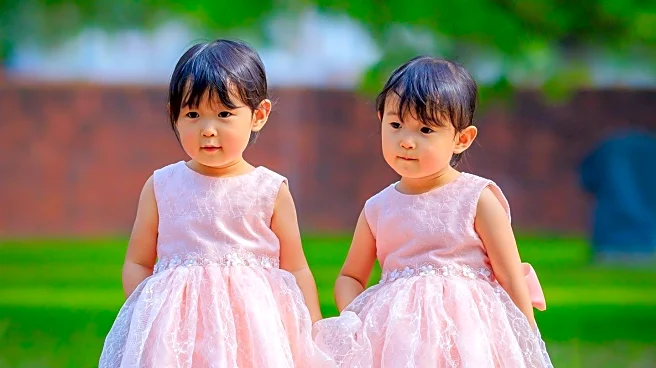What's Happening?
Abby and Brittany Hensel, conjoined twins from Minnesota, have continued their careers as fifth-grade teachers while navigating personal milestones. Born in 1990, the twins are dicephalic parapagus, meaning they have two heads but share one body. They
graduated from Bethel University with degrees in education and have been working as teachers in Minnesota. Abby recently married Josh Bowling, a nurse and Army veteran, in 2021. The couple has been seen with a newborn baby, sparking speculation about their family life. Despite their unique condition, the twins have managed to lead relatively normal lives, engaging in activities such as traveling and playing sports.
Why It's Important?
The Hensel twins' ability to maintain a normal lifestyle despite their condition is significant in highlighting the possibilities for individuals with disabilities. Their story challenges societal perceptions of disability and showcases the potential for conjoined twins to lead fulfilling lives. As educators, Abby and Brittany serve as role models, demonstrating resilience and adaptability. Their personal milestones, such as Abby's marriage, further emphasize the twins' determination to live life on their own terms, inspiring others facing similar challenges.
What's Next?
The twins are expected to continue their teaching careers while managing their personal lives. As public figures, they may face ongoing media attention, particularly regarding their family dynamics. Their ability to balance professional responsibilities with personal milestones will likely continue to be a point of interest for the public. The twins' story may also influence discussions on disability rights and representation, encouraging more inclusive narratives in media and society.
Beyond the Headlines
The Hensel twins' story raises ethical and cultural questions about privacy and media representation. As conjoined twins, they have been subject to public curiosity and speculation, which can impact their personal lives. Their decision to share aspects of their lives through social media and reality TV reflects a desire to control their narrative. This highlights the importance of respecting the privacy of individuals with unique conditions while acknowledging their contributions to societal understanding of disability.
















